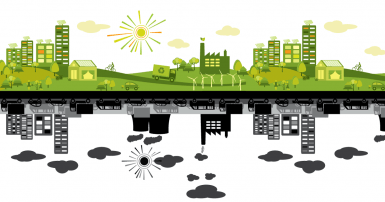Pierre Ducasse and Matthew Firth | CUPE Communications
Climate change may be the biggest crisis facing humanity. And it brings loads of challenges: environmental, economic and political.

Just Transition is based on the principle that the costs of transitioning to a more sustainable economy should be shared by everyone. Workers whose jobs are lost and people whose livelihoods are compromised should be supported with training, compensation, job opportunities and other supports, and workers should be involved in decisions that affect their livelihoods.
A Just Transition program for Canada should involve:
Employment insurance and skills training. We need a better Employment Insurance and skills training system so workers have support for moving to new job opportunities. We need to identify the training gap and the skills – both new and transferable ones – that will help us transition from high-carbon jobs to low-carbon jobs.
Industrial strategies. It is not just workers that are transitioning, but entire sectors and even communities. We need industrial and sectoral policies to be developed by employers, labour, government and other stakeholders that proactively and collaboratively make the transition to a low carbon and more sustainable economy.
Public sector. The public sector has a huge role to play in leadership, regulation and direct investments, including renewable energy production, public transportation and new infrastructure. We can’t leave our future in the hands of the same market forces that have crashed the economy and are ruining our environment.
Communities and social justice. Special attention also needs to be given to local communities, Indigenous peoples, precarious workers, marginalized groups, low income people and social justice. If building a greener economy leads to more poverty and exclusion, then it could hardly be called a success.
For CUPE’s National Secretary-Treasurer, Charles Fleury, a just transition needs to be both comprehensive and compassionate. “The fight against climate change cannot be waged at the expense of workers, communities or developing countries. The final accord should involve a just transition to a carbon-free economy, including financial incentives for the poorest countries.”
The changes we are facing will be significant and transformational, but necessary. We need to plan and act now. Do we need to leap? Yes. But if we are to succeed, we need to look before we do.


